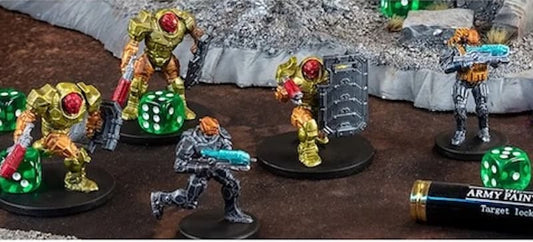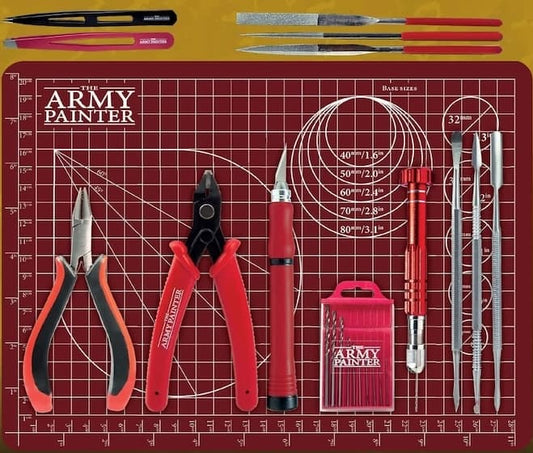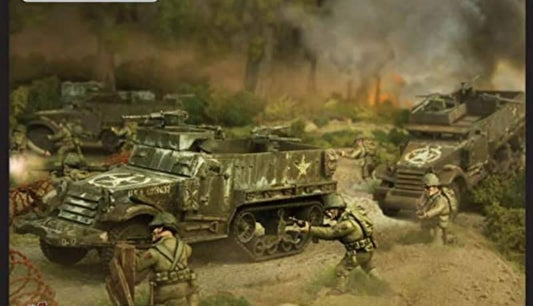Are you wondering where table top war games originated? As with many gamers, I love history and knowing what came before me so I can understand the current state and context of tabletop gaming. So, I did some digging to find out where this amazing pastime comes from!
I can tell you upfront that the wargaming hobby is much older, deeper, and more important to human history than you may have first thought!
Wargaming Ancient History in a Nutshell
Tabletop gaming has been around for centuries, with the first recorded instance being an ancient Egyptian game called Senet. The best war games tabletop were played on a board that had 30 squares, with 10 playable pieces. It is believed that the table war games served as a way for people to pass their time, but also likely had religious connotations.

Over the centuries, new war game table and variations on existing ones continued to emerge, with one of the most notable being Chess. This board game originated in northern India in the 6th century AD, and was played initially as a two-player game, with each player controlling 16 pieces.
However, modern tabletop miniatures games is generally understood to have originated in the early 19th century. This is when Prussian military officer Georg von Reiswitz created a detailed set of rules and guidelines for his own personal use as a way to train his soldiers on battlefield maneuvers.

Of course, arguably, how you determine "firsts" of anything depends on how you define your terms. So, while Georg von Reiswitz may have created the first set of concrete rules for wargaming, for practical reasons, there were likely others before him who played and engaged in similar "miniatures games" without such rigid structure.
In any case, what's important is that tabletop miniatures game as we know it today has a long and rich history that spans centuries and cultures. And, with that said, let's take a more in-depth look at the history of tabletop wargaming!
The Early History of Wargaming
As mentioned, tabletop wargaming is a hobby that can be traced back to ancient times, when armies would clash on battlefields in real life. However, it wasn't until the early 20th century that tabletop wargaming as we know it began to take shape, e.g., historical miniature wargame simulations like Carnage and Glory II (reviewed here) or Warmachine/Hordes, a steampunk-inspired tabletop game.

In the early days, according to my research, tabletop wargaming was mostly a solo activity, with players using miniature figures to simulate battles; playing them out visually and tangibly to enact and understand the tactical nuances of battle. Or, simply to display the unfettered glory of "seeing" a snapshot of a violent period of human history.
Over time, as with many hobbies and pastimes, rules with such games were refined and customized by hobbyists who were often members of clubs or organizations such as the Model Soldier Society in England. As people are drawn to others of similar interest, such groups grew, spread, and diversified.

By World War II, tabletop wargaming was becoming more mainstream and popular among civilians as a way to engage with military history.
Moving forward into our contemporary time, we continue to see an active and thriving community that is constantly innovating and improving the medium. Some have taken their love of history a step further, using their knowledge and skills to produce detailed historical rules...or games with rules built for a more accessible audience interested in the aesthetic and nostalgia of those periods.

The Modern Age is Defined by Diversity in Gaming Genre
Of course, as I mentioned, the thrill of such enactments draw the imagination, so these rules and games diversified into the science fiction and fantasy realms, such as Warhammer 40k, Age of Sigmar, and so many other globally recognized games played by the young and young-of-heart.
It wasn't until the 1960s that multiplayer gaming began to take off, and by the 1970s there were several popular tabletop wargaming magazines and clubs. For example, the magazine "Strategy & Tactics" was first published in 1966, and is still being published today.

The first globally popular sci-fi tabletop wargame was undoubtedly "Warhammer", which was released in 1987. "Warhammer" quickly became a sensation, spawning numerous spin-offs, sequels, and video games. In this case, this created the first golden age in the 1980s which saw a dramatic increase in popularity for tabletop wargaming, thanks in part to the release of games like Warhammer and Advanced Squad Leader.
These games featured more complex rules and allowed for a greater level of customization, which appealed to gamers who were looking for a more immersive experience. Today, the "Warhammer" franchise is one of the most successful in the world, and tabletop wargaming hobby is more popular than ever.

So, What is it That Makes Tabletop Wargaming Captivating?
There are a number of factors, but I think one of the main reasons is that it offers a unique blend of strategy and tactics. Unlike video games, tabletop wargames require players to think on their feet and make decisions in real time. This can be a daunting task, but it's also incredibly rewarding when you manage to outsmart your opponent.
Another benefit of tabletop wargaming is that it's a very social activity. Unlike video games, which can be played alone, tabletop wargames require players to interact with one another. This can lead to some great conversations and friendships, and it's a great way to meet new people.
So if you're looking for a new hobby that offers a mix of strategy, tactics, and social interaction, then tabletop wargaming might be the perfect fit for you. With games like Warhammer 40k, Bolt Action, and other gaming systems, you'll certainly find something to your liking.
Whether you're a fan of ancient battles or modern warfare, there's a tabletop wargame out there that's just right for you. So why not give it a try? Check out Wargames Delivered selection of miniature wargaming starter sets and miniatures! You might be surprised at just how much fun you can have.
Thank you for reading! I hope this article has given you a better understanding of the history of tabletop wargaming. Feel free to share it with your friends and family.
Happy gaming!
You might also like Napoleonic: British, French, Portuguese, Prussians, or Russians.



